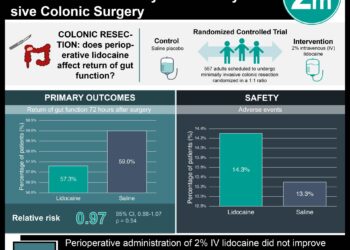Laparoscopic colon cancer management may be beneficial in elderly
1. In older patients with colorectal cancer, laparoscopic surgery (LAP) resulted in overall survival (OS), disease-free survival (DFS), and cancer-specific survival (CSS) did not differ significantly when compared to more invasive open surgery (OP).
2. Colon cancer patients who underwent LAP experienced reduced morbidity and surgical complication events when compared with patients receiving OP.
Evidence Rating Level: 2 (Good)
Study Rundown: Colorectal cancers are common in both men and women, and are the third leading cause of cancer-related death in the United States. Surgeries to remove the cancer, such as LAP or OP, can improve patient outcomes. Studies have shown that LAP is a less invasive surgery technique with comparable oncologic outcomes to OP. However, these studies did not compare surgical methods in older patients.
This study investigated survival events following LAP and OP for elderly (>79 years of age) colon cancer and rectal cancer patients. For both cancer types, no significant difference was found for OS, DFS, and CSS when comparing LAP and OP recipient groups, suggesting the less invasive LAP is not inferior to its more invasive counterpart. Additionally, LAP colon cancer patients experienced reduced morbidity events including postoperative delirium, surgical site infection, and pneumonia. No such positive reductions were seen in the smaller rectal cancer patient group. While, when compared with OP patients, LAP patients experienced significantly longer surgery times, they had decreased blood loss and decreased time until initiation of fluid intake. These findings provide evidence that LAP may be a valuable alternative to OP in elderly colorectal cancer patients, particularly in the case of colon cancer. This study is limited in its retrospective approach, which may have associated selection bias and inconsistent treatment regimens, particularly with respect to postoperative chemotherapy practices.
Click to read the study in the Annals of Surgical Oncology
Relevant Reading: Survival after laparoscopic surgery versus open surgery for colon cancer: long-term outcome of a randomised clinical trial
In-Depth [retrospective matched case-control study]: This study used data collected from 41 Japanese hospitals to compare outcomes of LAP and OP in 804 colon cancer patients and 114 rectal cancer patients. All patients were >79 years of age resulting in a study group with a median age of 83. While tumor size differed between the LAP and OP groups for both cancers, balancing of covariates and Cox regression analyses were used to determine that the difference had no statistical influence on overall survival or post-surgical complications.
At 3 years post-surgery, no difference was found between LAP and OP colon cancer patient groups for OS (p = 0.916), DFS (p = 0.968), or CSS (p = 0.799). Similar results were found for rectal cancer patients. Morbidity rates were 24.9% for LAP recipients and 36.3% for OP recipients (p < 0.001). While morbidity rates were higher for rectal cancer recipients of LAP than of OP, this difference was not significant. Post-surgery pneumonia, delirium, and surgical site infection were significantly reduced for colon cancer LAP patients when compared to the colon cancer OP group.
More from this author: Deep brain stimulation linked to declining brain function in Parkinson’s patients, Donor and recipient regulatory T-cells may promote transplant tolerance in mice, Growth factor embedded film promotes robust bone repair, The 3C Study: Alemtuzumab may reduce acute rejection following kidney transplant, Paclitaxel-coated balloons may decrease bronchial stenosis in lung transplants
Image: US Navy/PD
©2012-2014 2minutemedicine.com. All rights reserved. No works may be reproduced without expressed written consent from 2minutemedicine.com. Disclaimer: We present factual information directly from peer reviewed medical journals. No post should be construed as medical advice and is not intended as such by the authors, editors, staff or by 2minutemedicine.com. PLEASE SEE A HEALTHCARE PROVIDER IN YOUR AREA IF YOU SEEK MEDICAL ADVICE OF ANY SORT.







